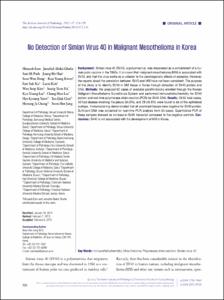No Detection of Simian Virus 40 in Malignant Mesothelioma in Korea
- Keimyung Author(s)
- Kwon, Kun Young
- Department
- Dept. of Pathology (병리학)
- Journal Title
- Korean Journal of Pathology
- Issued Date
- 2013
- Volume
- 47
- Issue
- 2
- Abstract
- Background: Simian virus 40 (SV40), a polyomavirus, was discovered as a contaminant of a human polio vaccine in the 1960s. It is known that malignant mesothelioma (MM) is associated with SV40, and that the virus works as a cofactor to the carcinogenetic effects of asbestos. However, the reports about the correlation between SV40 and MM have not been consistent. The purpose of this study is to identify SV40 in MM tissue in Korea through detection of SV40 protein and DNA. Methods: We analyzed 62 cases of available paraffin-blocks enrolled through the Korean Malignant Mesothelioma Surveillance System and performed immunohistochemistry for SV40 protein and real-time polymerase chain reaction (PCR) for SV40 DNA. Results: Of 62 total cases, 40 had disease involving the pleura (64.5%), and 29 (46.8%) were found to be of the epithelioid subtype. Immunostaining demonstrated that all examined tissues were negative for SV40 protein. Sufficient DNA was extracted for real-time PCR analysis from 36 cases. Quantitative PCR of these samples showed no increase in SV40 transcript compared to the negative controls. Conclusions: SV40 is not associated with the development of MM in Korea.
- Keimyung Author(s)(Kor)
- 권건영
- Publisher
- School of Medicine
- Citation
- Minseob Eom et al. (2013). No Detection of Simian Virus 40 in Malignant Mesothelioma in Korea. Korean Journal of Pathology, 47(2), 124–129. doi: 10.4132/KoreanJPathol.2013.47.2.124
- Type
- Article
- ISSN
- 1738-1843
- Appears in Collections:
- 1. School of Medicine (의과대학) > Dept. of Pathology (병리학)
- 파일 목록
-
-
Download
 oak-aaa-03361.pdf
기타 데이터 / 2.76 MB / Adobe PDF
oak-aaa-03361.pdf
기타 데이터 / 2.76 MB / Adobe PDF
-
Items in Repository are protected by copyright, with all rights reserved, unless otherwise indicated.